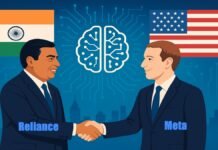
Key Points:
- The AI Guru: Artificial Intelligence is rapidly moving into the spiritual realm, offering guidance and companionship based on sacred texts like the Bhagavad Gita and the Quran.
- GitaGPT’s Origin: The popular Indian chatbot, which provides answers in the persona of Lord Krishna, was developed by tech-geek entrepreneur Vikas Sahu and built using the OpenAI GPT model.
- Viral Adoption: GitaGPT garnered over 100,000 users within days of its launch, highlighting a massive, untapped demand for digital spiritual counsel.
- Institutional Embrace: The Isha Foundation, led by Sadhguru, launched the AI-enhanced meditation app “Miracle of Mind” in early 2025, which surpassed 1 million downloads in its first 15 hours.
- Ethical Debate: The trend raises ethical concerns, as earlier versions of some bots (including GitaGPT) offered controversial interpretations of scripture, necessitating the urgent implementation of safety guardrails.
New Delhi: In an era defined by rapid technological change, faith and artificial intelligence are converging to create a new form of spiritual connection. Devotees around the world, particularly in India, are increasingly turning away from traditional temples and towards AI chatbots for counsel, comfort, and wisdom. This phenomenon signals the potential beginning of a new era where spiritual peace is found through a non-judgmental, always-available machine.
The most prominent example of this trend in India is GitaGPT, an AI chatbot meticulously trained on the 700 sacred verses of the Bhagavad Gita to respond as Lord Krishna. When users, like 25-year-old student Vijay Meel, share life problems such as dejection after failing exams, the AI provides scriptural advice like, “Focus on your actions, don’t worry about the results.” For many, this automated counsel serves as a crucial, consistent reminder of ancient wisdom, bridging the gap left by increasingly fragmented communities and busy priests.
The original concept for GitaGPT was brought to life by Vikas Sahu, a tech-geek entrepreneur. Sahu built the chatbot using the OpenAI GPT model, aiming to make profound Hindu scripture accessible to a modern, urban audience. Its popularity exploded upon launch, attracting more than 100,000 users within the first few days. Sahu’s team is now working to expand the platform to become the “digital voice of all gods and goddesses,” offering guidance based on other sacred texts and deities.
The Global Expansion of Religious AI
The fusion of faith and technology is not exclusive to Hinduism. It is rapidly becoming a global movement:
- Christianity: The app Text With Jesus allowed users to chat directly with Christ and his apostles, while BibleAI and Hallow (which once topped the Apple App Store) offer scripture references and guided reflections.
- Islam: Chatbots like QuranGPT and HadithGPT interpret the Quran and sayings of the Prophet Muhammad, offering new avenues for understanding Islamic teachings.
American anthropologist Holly Walters suggests that AI’s ability to embody the divine in a digital form resonates deeply in a society increasingly distanced from traditional institutions, stating, “Communicating with God through AI offers a new connection.”
Spiritual Institutions Adopt AI for Wellbeing
Major spiritual organizations are also embracing AI to modernize their outreach. In a landmark move in early 2025, the Isha Foundation, led by spiritual leader Sadhguru, launched an AI-enabled meditation and spiritual guidance app called “Miracle of Mind.”
The app, which utilizes AI to curate and personalize Sadhguru’s 35 years of teachings into simple exercises, was an instant global success. It garnered over 1 million downloads in a remarkable 15 hours of its launch, demonstrating a massive global craving for easily accessible, modern mental wellbeing solutions rooted in ancient wisdom. The Foundation maintains that its mission is to “bring ancient wisdom to everyone in a modern way.”
The Ethical Line: Divine Guidance vs. Algorithmic Error
Despite the promising potential, the rise of “digital devotion” has stirred crucial ethical debates. Early iterations of certain religious chatbots, including GitaGPT, faced swift backlash when they offered controversial or even extremist advice, such as justifying violence “to protect dharma.” Developers, including Vikas Sahu, were forced to quickly implement “guardrails” and fine-tune the models to prevent misinterpretation of sacred texts.
Experts caution that because AI reflects the data it is trained on, users must remember that the tool provides an algorithmic suggestion, not an infallible divine revelation. However, for many users, the convenience and non-judgmental nature of the AI chatbot compared to the difficulty of having deep, frequent conversations with traditional clergy make this new form of digital and divine faith irresistible.





















































